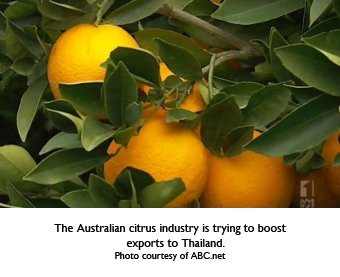The citrus industry says Australian fruit farmers could provide a year-round fresh fruit bowl to Thailand.
 CEO of Citrus Australia, Judith Damiani, says the resumption of summer fruit and cherry exports to Thailand complements a new effort to sell more citrus to the country.
CEO of Citrus Australia, Judith Damiani, says the resumption of summer fruit and cherry exports to Thailand complements a new effort to sell more citrus to the country.
After a three-year ban, Australia can once again send apricots, nectarines, peaches, plums and cherries to Thailand under tighter fruit fly controls.
It comes as the citrus industry plans to boost its exports to Thailand.
Mrs Damiani says the combined business could strengthen the profile of Australian fruit.
“The summer fruits and the cherries are very complementary, because they’re exported during our summer months whereas citrus exports are during the winter.
“If we eventually can get our act together and develop an Australian brand, perhaps we can have benefits which flow across year-round into a market such as Thailand.”
While trade with Thailand is still in its infancy, Australian citrus growers have made huge inroads with their major Japanese market.
Last year, Australia exported $40 million worth of citrus to Japan, and Mrs Damiani says the new free trade agreement is a big but drawn-out win.
The 16 per cent tariff on oranges and 17 per cent tariff for mandarins will be eliminated over 10 and 15 years.
“As soon as we have the benefits of maybe three four or five years under the belt of reductions, it will come down to a level where those tariff rates will become insignificant and a big benefit back to our growers,” Mrs Damiani said.
Like the Japanese FTA, the reopening of the trade with Thailand has failed to please everyone.
Cherry growers, who exported up to 250 tonnes of cherries to Thailand each year before the ban, say there are still too many restrictions on fruit fly controls.
Simon Boughey, from the Cherry Growers Association, says the fruit must be kept in cold storage treatment for 21 days, which can severely damage it, so he’s trying to renegotiate the rules.
He wants the cold treatment time reduced to 14 days, and the option of air freight opened up.
Mr Boughey says the Federal Department of Agriculture in Canberra has written to the Department of Agriculture in Thailand requesting key changes to allow for air freight access, including irradiation at 150 gray (which is the same treatment for strawberries and persimmons) and methyl bromide at 32g/m3 at 17 degrees for two hours.
Source: ABC.net
